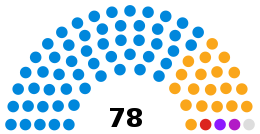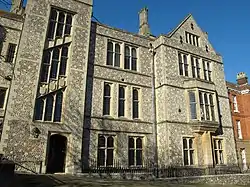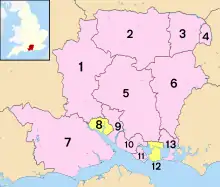Hampshire County Council
Hampshire County Council (HCC) is the county council that governs the majority of the county of Hampshire in England. It provides the upper tier of local government, below which are district councils, and town and parish councils. The county council has 78 elected councillors, and is based in the county town of Winchester. Whilst they are part of the ceremonial county of Hampshire, Southampton and Portsmouth are unitary authorities, and therefore are not part of Hampshire County Council, with powers instead held by their respective councils. Hampshire County Council has been controlled by the Conservative Party since 1997.
Hampshire County Council | |
|---|---|
 | |
 | |
| Type | |
| Type | |
| Leadership | |
Chair of the Council | Cllr Melville Kendal since 29 May 2020[1] |
Leader of the Council | |
Chief executive | John Coughlan since 2 November 2015 |
| Structure | |
| Seats | 78 councillors[3] |
 | |
Political groups |
|
Length of term | 4 years |
| Elections | |
| First past the post | |
Last election | 7 May 2017 |
Next election | 6 May 2021 |
| Meeting place | |
 | |
| Castle Hill, Winchester[4] | |
| Website | |
| www | |
History
The county council was formed in 1889, governing the administrative county of Hampshire. Alongside Christchurch, in 1974 Bournemouth was split into Dorset, as well as a number of minor border changes. Whilst they are now part of a unitary authority alongside Poole, they remain in the ceremonial county of Dorset. In the same reorganisation, the various boroughs, urban districts and rural districts in Hampshire were reorganised into thirteen districts for the purposes of local government, forming the lower tier below the county council. In 1997 Southampton and Portsmouth were split off into respective unitary authorities under the 1992 Local Government Act, and are therefore no longer part of Hampshire County Council and hold their own elections for their own councils, although they remain part of the ceremonial county of Hampshire. Since then there have been several attempts made at a form of devolution deal for Hampshire (and sometimes the Isle of Wight, historically part of Hampshire) as a whole, but have no so far been successful.[5]
From 1973 Hampshire County Council has either been under no overall control or Conservative control, with the council currently having been under Conservative control since 1997. Generally the Liberal Democrats have been the largest opposition, with the Labour Party, UKIP, and Community Campaign (Hart) also having representation alongside independents. The most recent election in 2017 saw the Conservatives increase their majority, taking 56 of 78 seats. The next elections are due to take place in 2021, alongside the delayed district elections.
Responsibilities
The council is responsible for public services [6] such as:
- Highway management
- Waste disposal
- Children's services (including supporting schools, families and young people)
- Social care
- Libraries
- Discovery Centres
- Country parks
- Public Health,[7]
Local government

Hampshire is divided into thirteen districts, with eleven of them lying within Hampshire County Council. Italics denote unitary authorities, who do not come under Hampshire County Council:[8]
Elections
The most recent Hampshire County Council elections were held on 4 May 2017.[9] The incumbent Conservatives (majority since 1997) increased their majority from 45 to 56, over a two thirds majority, whilst the Liberal Democrats, the second largest party, won two new seats, increasing their seats to 19.The Liberal Democrats performed best around Winchester, and Eastleigh, whilst the Conservatives performed well across rural areas. Labour and UKIP meanwhile both lost seats, with Labour losing two of their four seats in Basingstoke, whilst UKIP lost all representation across the County. Community Campaign (Hart) managed to retain their only seat, Church Crookham & Ewshot, while also standing in a second county seat for the first time in Fleet Town, where they came second place after the Conservatives, who won with a majority of 508. The Green Party also increased their vote share, but failed to gain representation. The sole independent incumbent, in Lymington, lost their seat.
Notable members
- Henry Paulet, 16th Marquess of Winchester, Chairman 1904–1909
- James Harris, 5th Earl of Malmesbury, Chairman 1927–1937
- Sir John Crowder, member 1931–1946
- Horace King, Baron Maybray-King, member 1946–1965
- John Denham, member 1981 to 1989, later a member of parliament
- Mike Hancock, Leader 1989 to 1997, later a member of parliament
- Henry Herbert, 7th Earl of Carnarvon, Chairman 1973 - 1977
- Alexander Baring, 6th Baron Ashburton, member 1945 - 1972
- Roy Perry, Leader 2013 - May 2019
- Percivall Pott, elected member, 1949, later member of parliament for Devizes in Wiltshire
References
- "The Chairman of Hampshire County Council". Hampshire County Council. Retrieved 22 September 2020.
- "New Leader and Chairman for Hampshire County Council". Hantsweb. Hampshire County Council. Retrieved 23 July 2019.
- "Your Councillors". Hampshire County Council. Retrieved 22 September 2020.
- "Map" (PDF). Hampshire County Council. Archived from the original (PDF) on 22 February 2016. Retrieved 2 September 2017.
- "Coast joint authority plan dropped". BBC News. 30 June 2015. Retrieved 22 September 2020.
- "Services". Hampshire County Council. Retrieved 22 September 2020.
- "Public Health in Hampshire". Hampshire County Council. Retrieved 22 September 2020.
- "About the Council | Governemnt in Hampshire". Hampshire County Council. Retrieved 22 September 2020.
- "Election results by party, 4 May 2017". Hampshire County Council. Retrieved 22 September 2020.